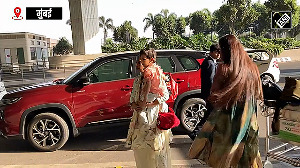When Kapur questioned the President's commitment to get the deal through Congress, Rove shot back saying Bush was totally committed and in fact, that very afternoon (May 3) he was meeting with a group of lawmakers in the White House to pitch for speedy clearance of the deal.
Sources present at the meeting, which was closed to the media, said Rove in his welcome remarks assured that the nuclear deal was one of the major foreign policy imperatives of the President, to which he was totally committed.
Rove said the Indian American community could play an integral role in influencing lawmakers to co-sponsor the legislation in Congress and push for its speedy approval.
At this point, Kapur interrupted to point out that while he was a Democrat, he was showing strong bipartisan support to ensure the passage of the bill and added that it was disappointing the President did not make time to meet the community leaders, who had come down to the capital to lobby for his bill.
Kapur accused Rove of talking like former Democratic Presidential candidate Michael Dukakis, whose refrain was 'You just don't get it', and said the President and the White House was merely offering lip service to the cause.
A visibly angry Rove retorted, 'With all due respect, I do not talk like him (Dukakis) and I totally reject what you have said.'
The President's aide said he was aware many Democrats were present at the briefing, and asked that such bipartisan support continue in the weeks ahead.
Other Administration officials on hand to brief the community leaders were Robert Joseph, Under Secretary of State for Arms Control and International Security Affairs; Michael Allen, the National Security Council' point man for legislative affairs; John Rood, the NSC's strategic affairs specialist who is involved heavily in pushing for the US-India deal; and Brian McCormack, the head of the White House Office of Public Liaison who organized the event in coordination with community activist Swadesh Chatterjee and with Nilesh Mehta, president of the Indian American Forum for Political Education.
Joseph, Allen and Rood provided details of the agreement and talking points on how nonproliferation and other concerns being raised by critics could be addressed.
A day prior to the official briefing, McCormack at a Congressional reception at the Capital Hyatt organized by the IAFPE in conjunction with the other Indian American community organizations, suggested there was a strong possibility Secretary of State Condoleezza Rice would 'drop by' and 'definitely like to speak to the group.' Rice, however, did not attend the briefing, on the grounds she had been 'pulled away for an emergency State Department meeting.'
Kapur's set-to with Rove, meanwhile, got tongues wagging with a senior Republican Congressional staffer suggesting that "Ramesh Kapur personally insulted Karl Rove.
"Rove was really taken aback because he came (to the briefing) very jovial and he took pictures like for five to 10 minutes with several people in the room he was very laid back and everything."
The staffer quoted Kapur as telling Rove 'Iraq is the albatross around the President's neck, but this (the US-India nuclear agreement) is his legacy, and he should be here. We want a meeting with the President, we want face time with the President.'
"To go to the White House, where there is a certain level of decorum and respect and to be that rude and argue with the top presidential adviser, and especially when you are Democrat, is so utterly shocking and an embarrassment to the community," the staffer said.
Kapur however was totally unrepentant. He had "absolutely no regrets," he told rediff-India Abroad.
"It is his bill, he went to India and he comes back and says he needs the Indian American community support and to go and talk to the House and Senate, and he didn't come (to the briefing). I am a Democrat and I've been a Democrat since the 1980s, and I commend him for going to India and for this agreement. But this is all smoke and mirrors he is talking about (that he is committed to seeing his initiative approved).
"It would have been very symbolic if he had come and thanked the Indian American community for the work they are doing on his behalf on the Hill and to ask them to keep on doing it with the House and Senate. You can talk the talk, but you've got to walk the walk," he added.






 © 2025
© 2025